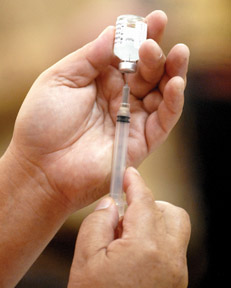California is at the center of a multi-state measles outbreak. It presumably started when an infected person (who has not been identified) visited Disneyland Resort Theme Parks in December 2014. About 40 people who visited or worked at the park became infected, and then people who were around those ill people, in doctor’s offices, schools and airplanes also became infected with this highly contagious virus. As of Feb. 6, over 100 cases in seven states had been reported as part of this outbreak. There are no cases in San Benito County.
What’s striking about this outbreak is that it is occurring in a country where measles has been eradicated for 15 years. But despite the MMR (measles, mumps, and rubella) vaccine and years of global efforts at elimination, it still exists in parts of Europe, Asia and Africa. Unimmunized U.S. residents can be exposed to measles when they travel to one of these areas or when an infected international traveler comes to the U.S., as is believed to be the cause of the current outbreak. In our world with frequent international travel, what the CDC Director Dr. Thomas Frieden said about Ebola is also true about measles: An outbreak anywhere is a threat everywhere.
However, just because an illness is introduced to a new community does not mean that it will persist. The virus needs susceptible people to pass from person to person. Immune persons who are around infected persons will mount an immune response to the virus and not get sick. People who have never been unimmunized, on the other hand, are likely to get sick. Not surprisingly, most of the infected people in this outbreak were unvaccinated.
Some of them were too young to be vaccinated; the first dose of MMR vaccine is given between 12 and 15 months of age. But most of them were unvaccinated because their parents chose not to vaccinate. All states allow medical exemptions for required school vaccinations. Most states allow religious exemptions, and California and 16 other states allow Personal Beliefs Exemptions (PBEs).
So why would anyone choose not to protect their child against a deadly disease? Parents may believe their child is unlikely to ever be exposed to a vaccine-preventable disease. They may be worried about the preservatives in or side effects of a vaccine. They may believe, erroneously, that vaccines cause autism, a theory that has been thoroughly and repeatedly debunked over the years.
However, if every family chose not to immunize, measles would be rampant in this country rather than limited to outbreaks. The fact that most people are immunized results in herd immunity. Herd immunity is like a firewall that prevents a contagious disease from taking hold in a community. Because immune people don’t become sick from a disease, they cannot pass it on to others. The higher the proportion of immune individuals, the lower the likelihood that a non-immune person will come into contact with an infectious person and become ill, and the disease will not be able to spread easily. Herd immunity is vital for those who cannot get or don’t mount a sufficient immune response to a vaccine because of age or medical conditions.
This outbreak spread because our level of herd immunity was not sufficiently high. There were too many susceptible people in the community to create a firewall. Higher vaccination rates would have prevented this outbreak. If we could immunize every susceptible person in the U.S., we would never see another measles outbreak. If we could immunize every susceptible person in the world, we could save nearly 150,000 lives each year.
Vaccines are one of the most significant public health advancements of the last century. Choosing to vaccinate means choosing to contribute to community immunity. If you haven’t done so already, I hope you decide to join the herd and immunize. Do it for yourself and your family. Do it for your community.
Dr. Anju Goel is the public health officer for San Benito County.










